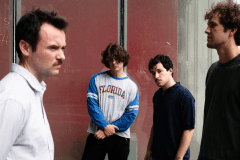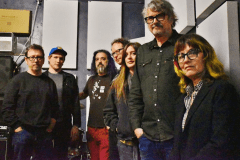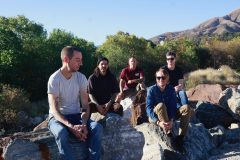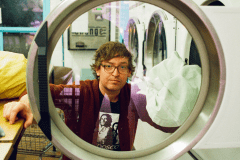Sydney’s Daniel Ahern was a nineteen-year-old college student when he released the heavy synth single “Lonely Ghost” from his moniker Bus Vipers. The song caught the attention of triple j Unearthed and soon was named a Featured Artist. The accolade offered Ahern a bevy of opportunities afterwards: heavy rotation of the single, collaborating and playing lice with artist Jonti, World Champion, and Chevaliers.
Signing to Future Classic earlier this year, Ahern has released his debut EP Federal Highway earlier this month. The six tracks that are part of ‘Federal Highway’ are packed with kaleidoscopic textures, electronic flourishes, garage rock/funk pulses, and melodic power-pop. Ahern explains that ‘Federal Highway’ wanted to evoke the feeling of ‘being stuck in a liminal space or caught between two dimensions – between childhood and adulthood, between relationships, and between Sydney and Canberra”.
We caught up with Ahern recently to talk about music, the new EP, what helped him overcome his unfortunate diagnosis of alopecia at the age of eleven, and more. Here’s what he had to say:
I saw that you recorded every instrument used on the EP yourself. What was the reasoning behind going towards the route?
In some senses, music is the same as any other art form. Collaboration is the norm that prevails in some forms – e.g. theatre, film, music – while solo work prevails in others – painting, writing etc. However, working collaboratively is never essential and I believe it creates a totally different process where your output becomes a result of compromise between a number of egos with different skill sets. That is fine, but as my primary project, I felt that Bus Vipers needed to be “solo” so that I could maintain control over my ideas and ensure that the vision I had when I began working on ‘Federal Highway’ was ultimately realized. Playing every instrument on the record is one of a few ways that I have attempted to keep a reasonable amount of control over this record.
You dealt with some pretty heavy stuff growing up. Did music help overcome of those feelings you were experiencing?
Yes, it did, it was a perfect place to escape where I could just deal with pure/abstract ideas and feelings. Plus the dream of “being discovered” took on a different meaning for me – offering the possibility of “redemption” and rebirth after having a lot of negative things happen, rather than just being an obvious and narcissistic dream.
When did it become clear that playing music was going to be something more for you?
I liked school and found I was good at a lot of different types of subjects when I applied myself really intensely, however with music I never really had to apply myself – I just went with my instincts and had fun and things would still turn out well. I think that’s a sign that something is for you – the ability to achieve without having to concentrate and be “serious” all the time.
You were finishing up getting your law degree while working on this album. What inspired you to go into the line of work possibly?
I believe that law gives you the keys to effect real social change and allow others to access the justice system, which is for everyone. Pretty textbook answer but it’s true – law is an altruistic profession that has unfortunately been corrupted by graduates who just see it as a glorified finance degree. I studied law because I have a desire to effect positive social change.
You said that each song on the album explores the feeling of being between spaces. What did you mean about that?
The record came out of a place of bad home-sickness – I was literally writing these songs while going back-and-forth between cities, studying a degree that I sometimes felt was taking me down a path I did not want, and feeling like I was missing opportunities to do music successfully as I had chosen to live in a place that was 10 times smaller (Canberra) than my home city (Sydney), with little support for emerging artists.
“Federal Highway” is the literal road that I was traveling every couple of weeks, but during that time I was also trying to understand my own identity – law vs music being an example of something I was agonizing about. I found that a “federative” approach to these issues was usually the best way to feel comfortable with them – rather than choosing one polar opposite.
The artwork and photos associated with the new album is bold and futuristic. What was the vision behind it?
I was “coming of age” during this record, thinking about my identity from what felt like an external perspective – hence all the mask imagery in the videos and press shots and the “Daniel’s” songs on the EP. Prue Stent and Honey Long who were behind the art direction also felt like my alopecia opened up unique aesthetic opportunities, and wanted to explore that condition in a creative and provocative way.
For more on Bus Vipers:
Website
Soundcloud
Instagram
Facebook
Twitter







Social Media